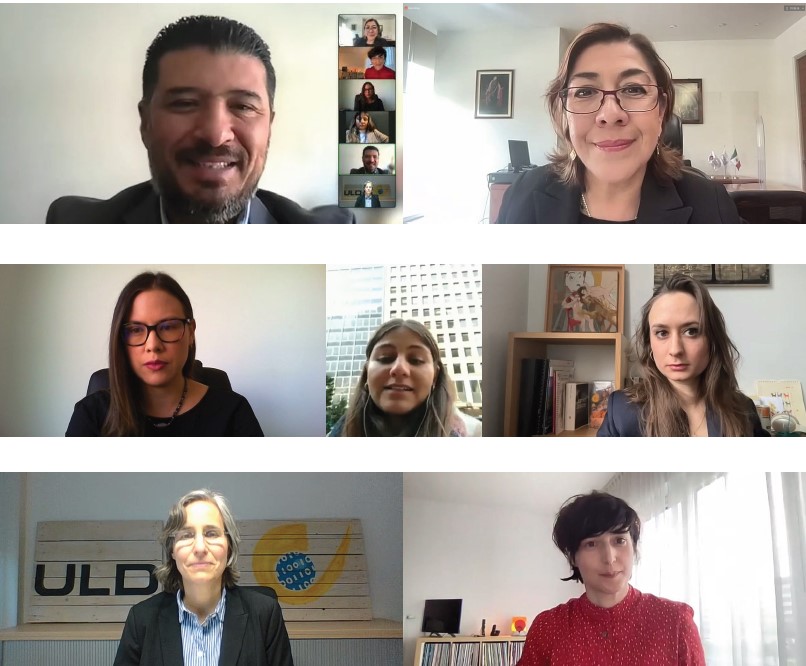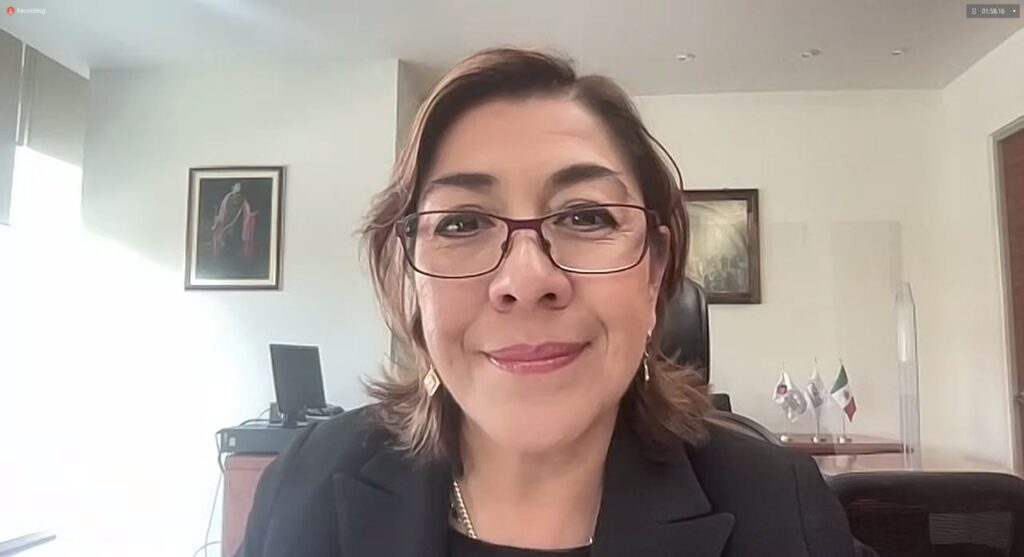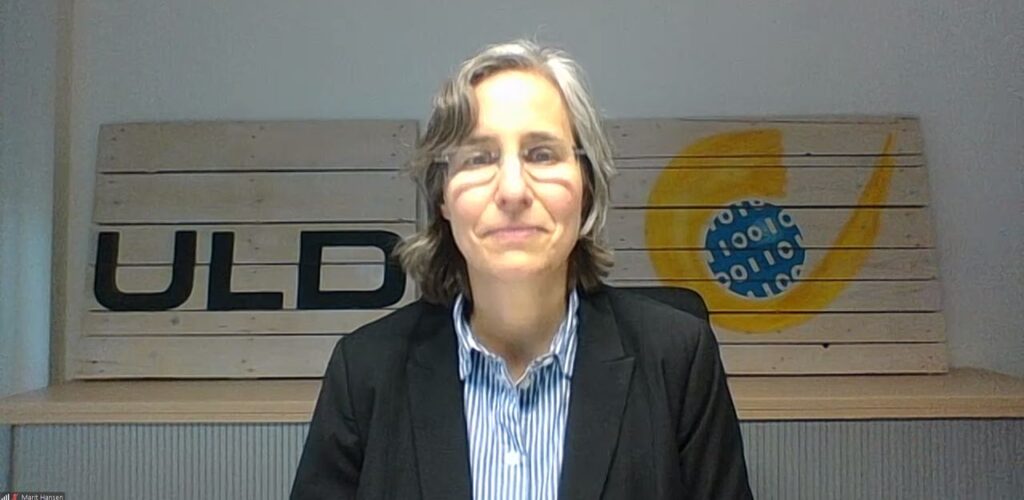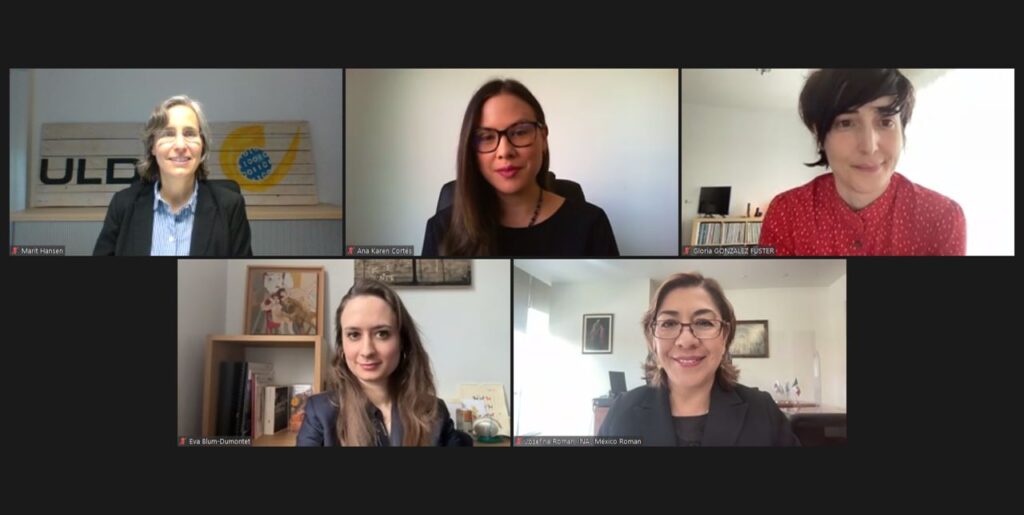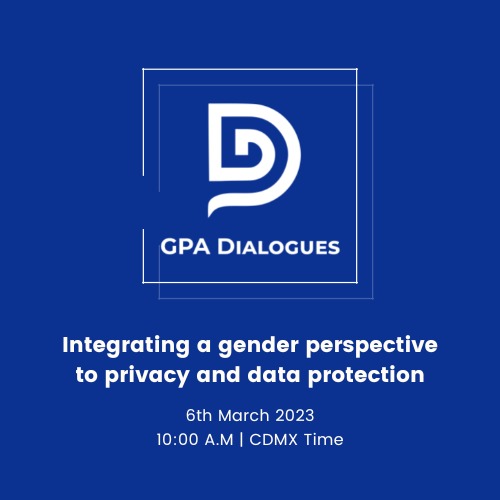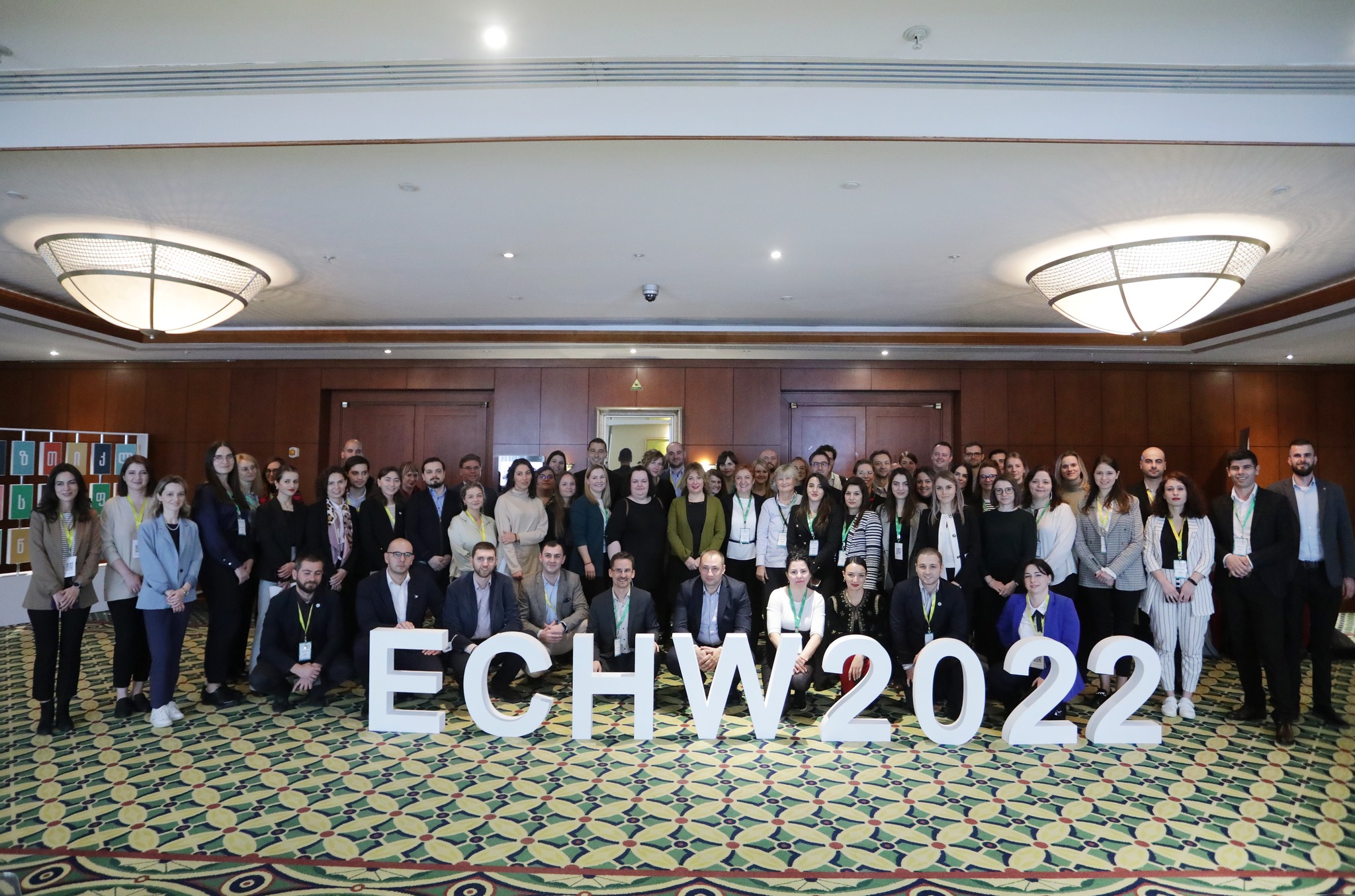Urgent to promote measures to eradicate violations of the right to privacy in the digital age, which affect women
On Monday, March 6th, within the framework of the International Women’s Day commemoration,
the first edition of the GPA Dialogues took place, an activity organized by the Chair of the Global Privacy Assembly, with the purpose of opening spaces for public discussion on cutting-edge and common-interest issues regarding privacy and personal data protection.
GPA Dialogues
The plenary board of the Institute for Transparency, Access to Information and Personal Data Protection (INAI) as Chair of the GPA is pleased to invite you to the first edition of the GPA Dialogues where we will have an opportunity to listen to experts in the field of privacy data protection with a gender perspective.
The European Case Handling Workshop, 2022 Accomplished In Tbilisi
The European Case Handling Workshop, 2022 organized by the Personal Data Protection Service of Georgia accomplished today in Tbilisi.
More than 50 delegates of personal data protection authorities from 26 countries attended the meeting.
The second working day of the forum, held on November 17-19, was devoted to the discussion of the following emerging topics: Data Protection in Social Media and Domestic Exemption; International Data Transfer; Personal Data and Artificial Intelligence; Data Breaches from Data Security
The Personal Data Protection Service Is Hosting The European Case Handling Workshop
The Personal Data Protection Service of Georgia is hosting the 2022 European Case Handling Workshop (ECHW).
The meeting is held in Tbilisi and more than 50 delegates of personal data protection authorities of 26 European countries are attending it. This year, the Workshop will address such significant topics as the stages of conducting inspections by data protection supervisory authorities; data protection in social media and domestic exceptions; international data transfers; personal data and artificial intelligence, etc.
Fee Funded Secretariat Application submissions is now open
If you are interested in applying to be the first Fee-Funded GPA Secretariat please head to the link below to download the application form and application guidelines. Application deadline is on 24th February, 2023.
Regulating the Digital Economy – Why Privacy and Competition Authorities Should Talk to Each Other
Data sits at the center of our digital economy and does not conform to regulatory or geographical boundaries. It is clear further understanding and collaboration by authorities across privacy, consumer protection and competition regulatory spheres is needed to achieve optimal regulatory outcomes. The Digital Citizen and Consumer Working Group (“DCCWG”) is focused on considering the intersections of, and promoting regulatory co‐operation between, the privacy, consumer protection and competition (also referred to as antitrust) regulatory spheres. In doing this, the DCCWG seeks to support “a global regulatory environment with clear and consistently high standards of data protection, as digitalisation continues at pace.” This article explores some of the key learnings of the DCCWG over the past 5 years. Ultimately, the DCCWG view is that collaboration between competition agencies and privacy agencies is becoming an imperative for any jurisdiction that seeks to achieve cohesive digital regulation.
By Melanie Drayton[1] & Brent Homan[2]
Canada preparing to release facial recognition guidelines
Clearview AI, adtech, focus of growing global data protection cooperation
Facial recognition firm Clearview AI and the ad-tech ecosystem are two key areas of focus for a 29-nation group of international privacy enforcers that and has substantially grown in membership and activity during the pandemic.
Privacy Enforcers Across the Globe Band Together to Coordinate investigations
The German and new U.K. data protection leaders diverged last week on their tone toward business during a top-dog conversation at the International Association of Privacy Professionals Global Privacy Summit 2022 in Washington, D.C. – but other privacy enforcers detailed seven instances of successful cooperation on investigations and productive engagement with different industries. This article reports on key global regulators’ comments at the summit about their priorities for 2022 and how they are increasing their enforcement capacity through coordination. See “Compliance Takeaways From the Latest GDPR Enforcement Statistics” (Feb. 2, 2022).
Demande de renseignements sur l’application de la loi concernant les fusions
21 mars 2022
Organismes : Federal Trade Commission et département de la Justice des États-Unis
No de dossier : FTC-2022-0003-0001
Je m’adresse à vous, par la présente, à titre de coprésident du Groupe de travail sur le citoyen et le consommateur numérique (GTCCN) de l’Assemblée mondiale pour la protection de la vie privée (AMVP). Formé en 2017, le GTCCN se concentre sur l’examen des intersections des sphères réglementaires de la protection de la vie privée, de la protection des consommateurs et de la concurrence ainsi que sur la promotion de la coopération réglementaire en la matière Notre travail, qui est au cœur de la stratégie de l’AMVP, vise à faciliter la coopération et la collaboration en matière de réglementation afin de créer un environnement réglementaire mondial doté de normes claires et strictes en matière de protection des données. Le GTCCN offre une tribune qui favorise le dialogue, la coopération et le partage des expériences en lien avec les questions d’intersection inter-réglementaire. Il souhaite aussi faire en sorte que les autorités des trois sphères réglementaires travaillent ensemble et adoptent une approche holistique, au moyen de cadres existants ou de nouveaux cadres, pour favoriser une économie numérique vigoureuse et concurrentielle où le droit à la vie privée est respecté.
La transformation numérique de l’économie mondiale a entraîné à la fois des possibilités et des difficultés pour tous les organismes de réglementation. Entre autres, cette transformation a donné lieu à de plus grandes intersections entre les régimes réglementaires qui encadrent la protection de la vie privée, la concurrence et la protection des consommateurs. Il est devenu évident que la fréquence et l’ampleur des intersections ne cesseront de croître, car l’interaction entre ces régimes façonne l’économie et la société numériques d’aujourd’hui.
Le GTCCN a récemment terminé des travaux qui portent à la fois sur la théorie et la pratique selon notre compréhension actuelle de cette intersection. Ces travaux ont conduit à la publication de deux rapports complémentaires, qui se trouvent en annexe au rapport annuel de 2021 du GTCCN. Le premier est un rapport universitaire indépendant commandé par le GTCCN et rédigé par la professeure Erika Douglas de la faculté de droit Beasley de l’Université Temple, ayant pour titre Carrefour numérique : l’intersection du droit de la concurrence et de la confidentialité des données (Carrefour numérique). (Veuillez noter que seuls l’introduction et le sommaire sont offerts en français. Les autres parties du rapport sont offertes en anglais uniquement.) Soulignons que Carrefour numérique est le premier rapport du genre à examiner en profondeur l’intersection entre la concurrence et la protection de la vie privée. Il donne un aperçu détaillé du paysage réglementaire actuel, il fait ressortir les compléments ainsi que les tensions entre les philosophies qui sont au centre de ces deux domaines et il souligne son élaboration émergente comme un défi inter-réglementaire important qui nécessite l’établissement d’un plus grand consensus ainsi qu’une collaboration à l’échelle internationale.
Le deuxième rapport est rédigé par le GTCCN et s’intitule La protection de la vie privée et des données en guise de facteurs dans la réglementation de la concurrence : sondage auprès des autorités de réglementation de la concurrence visant à améliorer la collaboration inter-réglementaire (Rapport d’entretiens). Se fondant sur une série d’entretiens menés auprès des autorités responsables de la concurrence du monde entier, ce rapport cible les domaines de synchronicité potentielle entre les régimes réglementaires ainsi que les obstacles à surmonter et les tensions potentielles à atténuer. Fait peut-être encore plus important, ce rapport comprend plusieurs exemples qui illustrent comment les autorités en matière de concurrence sont parvenues à intégrer avec succès des éléments liés à la protection de la vie privée dans leurs analyses d’application de la loi ainsi que dans la collaboration ou la considération inter-réglementaire et ont réussi à trouver un juste équilibre entre les deux sans sacrifier les objectifs de l’une ou de l’autre en cours de route.
Étant donné que notre groupe de travail est composé d’autorités de la protection des données et de la vie privée, nos observations se limiteront à la protection de la vie privée et à la collaboration inter-réglementaire; il ne s’agira donc pas directement d’une évaluation de vos lignes directrices existantes en matière de fusion. Nos observations seront en fonction des questions ci‑dessous, présentées dans votre demande de renseignements sur l’application de la loi concernant les fusions, dans le contexte des deux rapports susmentionnés et de l’intersection des sphères réglementaires de la protection de la vie privée et de la concurrence.
- Types et sources d’éléments probants
a. Le cadre des lignes directrices a-t-il été interprété d’une manière indûment restrictive comme étant principalement axé sur les résultats prévus d’une fusion sur le plan des prix? Est-ce possible que certains effets non liés aux prix n’aient pas été analysés adéquatement par rapport aux effets liés aux prix? De quelle façon les lignes directrices devraient-elles aborder ces effets? Quels éléments probants devraient être pris en considération dans les lignes directrices afin d’évaluer ces effets?
d. Le cadre des lignes directrices tient-il suffisamment compte de l’éventail de situations dans lesquelles une fusion est susceptible d’accroître la capacité des parties concernées ou d’autres acteurs du marché à réduire la concurrence, ou de susciter leur intérêt à le faire? De plus, ce cadre tient-il compte de l’éventail d’éléments probants qui peuvent être pertinents à cet égard?
6. Définition des marchés
h. Comment faut-il définir les marchés lorsque l’atteinte possible à la concurrence ne découle pas directement du risque de l’augmentation immédiate des prix, mais plutôt de facteurs à plus long terme ou de facteurs non liés aux prix, comme une perte de l’innovation, des changements au niveau de la qualité ou de la diversité des produits ou la création de nouvelles barrières à l’entrée?
11. Marchés numériques
a. En ce qui concerne les lignes directrices, l’analyse des fusions dans les marchés numériques devrait-elle différer de celle des fusions dans d’autres marchés? Si oui, en quoi devrait-elle être différente? Comment faut-il définir les marchés pour ce qui est des fusions dans le secteur numérique où les produits et les services connaissent une évolution rapide? De quelle façon les lignes directrices devraient-elles aborder les effets négatifs possibles sur la concurrence dans les marchés qui évoluent rapidement?
c. De quelle façon les lignes directrices devraient-elles aborder la définition des marchés dans le cas des marchés à prix zéro, des marchés à prix négatif ou des marchés sans prix explicites? Dans la définition des marchés, la « qualité » et d’autres caractéristiques peuvent-elles jouer le même rôle que le prix?
f. De quelle façon les lignes directrices devraient-elles permettre d’analyser les fusions où les regroupements de données constituent un motif ou un effet important? Comment devrait-on évaluer les économies d’échelle et de gamme dans ces cas-là?
La vie privée jouera un rôle plus important dans la politique de la concurrence
Comme il est indiqué dans Carrefour numérique, la vie privée jouera un rôle plus important dans la politique de la concurrence pour les marchés numériques. Dans cette optique, si l’on considère la vie privée comme un facteur non lié au prix de la concurrence, il n’est pas difficile d’imaginer comment une organisation peut se livrer à un comportement anticoncurrentiel. Si la réduction du nombre de concurrents sur un marché à la suite de fusions est susceptible d’entraîner l’augmentation des prix, l’inverse peut aussi être vrai en ce qui a trait aux mesures de protection de la vie privée comme élément de la qualité des produits et services. Quand les concurrents sont moins nombreux, il y a moins d’incitation à maintenir ou à améliorer les niveaux de protection de la vie privée en tant que composantes qualitatives d’un produit ou service. Dès qu’une entreprise numérique acquiert une position dominante sur le marché, ou détient un véritable monopole, les consommateurs n’ont guère d’autre choix que d’accepter un produit ou un service de qualité inférieure si cette entreprise décide de faire marche arrière et d’adopter ses anciennes pratiques en matière de vie privée. Par exemple, si cette entreprise commençait à suivre les habitudes en ligne de ses clients afin de monnayer les renseignements obtenus, l’absence de produits de substitution ne laisserait aux consommateurs d’autre choix que d’accepter des produits ou services de moindre qualité ou de cesser d’utiliser les produits ou services en question. Dans l’économie numérique d’aujourd’hui, ce n’est pas toujours réalisable, car les consommateurs dépendent de plateformes numériques dominantes et d’autres effets et externalités de réseau. Parallèlement, un géant du numérique disposant d’une emprise sur le marché pourrait supprimer les innovations permettant d’offrir des produits et services respectueux de la vie privée et éliminer potentiellement la concurrence quant au niveau de protection de la vie privée offert par les concurrents.
La grande importance accordée aux facteurs de concurrence liés aux prix et les efforts visant à réduire les facteurs de concurrence non liés aux prix sont susceptibles d’instaurer une approche « traditionaliste » à l’égard de la réglementation, comme il est expliqué dans le Rapport d’entretiens. Cette approche n’est pas propre aux organismes de réglementation de la concurrence, comme il est indiqué à la page 12 de ce rapport.
Cette approche part de l’idée selon laquelle les autorités chargées la concurrence peuvent remplir plus efficacement leur mandat en se concentrant sur les questions et les éléments de concurrence lors de l’évaluation du comportement en cause, en écartant tout facteur n’ayant aucun aspect concurrentiel. Selon cette approche, les évaluations concurrentielles reposent sur des indicateurs concurrentiels traditionnels, tels que les prix ou les parts de marché, et excluent généralement les facteurs tels que la protection de la vie privée.
Cette approche repose sur l’intervention d’autres organismes de réglementation pour traiter les autres enjeux, comme la vie privée, en fonction de leur domaine d’expertise. Comme il a été soulevé dans le Rapport d’entretiens, une approche de ce genre à l’égard de la réglementation de la concurrence pourrait mener à l’augmentation du nombre de règlements d’application ou de positions stratégiques dichotomiques qui favorisent la concurrence au détriment de la vie privée, ou vice versa. Un résultat binaire de ce genre risque non seulement de compromettre le droit à la vie privée, mais aussi de déjouer les efforts pour favoriser la concurrence au sein d’une économie numérique vigoureuse, entraînant des retombées sous-optimales. Selon nos recherches, nous sommes rendus à un point où les considérations en matière de vie privée et de données sont largement acceptées dans la communauté antitrust comme ayant le potentiel, dans certaines circonstances et sur certains marchés, d’être des facteurs importants dans le calcul de la concurrence.
La collaboration inter-réglementaire deviendra de plus en plus nécessaire
Le chevauchement des régimes réglementaires pour les marchés numériques appelle à une meilleure collaboration. Cela permettra de promouvoir une approche globale et uniforme en matière de réglementation numérique au profit de marchés compétitifs, à l’avantage des consommateurs et de leur droit à la vie privée.
Les avantages de la collaboration inter-réglementaire sont démontrés, par exemple, dans la résolution « Banque » de la Superintendencia Industria y Comercio (SIC), comme il est expliqué dans Carrefour numérique et le Rapport d’entretiens. La SIC est notamment l’autorité colombienne chargée entre autres de la protection des consommateurs, de la concurrence et de la protection de la vie privée. Tel qu’il est décrit en détail dans les paragraphes 78 et 79 du Rapport d’entretiens, l’organisme colombien de réglementation financière a demandé à la SIC d’effectuer une évaluation de la concurrence à la suite de la création d’une coentreprise numérique formée des trois plus grandes banques de la Colombie. L’équipe de la concurrence chargée de l’évaluation a souligné les répercussions sur la vie privée que cela pourrait entraîner et la nécessité pour la coentreprise de gagner la confiance des consommateurs envers ses services en faisant preuve de transparence et en respectant les règlements de la Colombie sur la protection des renseignements personnels. Par la suite, l’équipe a consulté ses homologues chargés de la protection de la vie privée et, malgré que l’évaluation ait porté sur la concurrence, elle a intégré plusieurs recommandations liées à la vie privée dans son rapport définitif.
On retrouve un autre exemple dans le « Digital Regulation Cooperation Forum » du Royaume-Uni, qui est formé des organismes suivants de ce pays : Competition and Markets Authority (CMA), Information Commissioner’s Office (ICO), Office of Communications, Financial Conduct Authority. Ce forum a été mis sur pied pour assurer une collaboration accrue dans les dossiers réglementaires portant sur des enjeux en ligne. En mai 2021, la CMA et l’ICO ont publié une déclaration conjointe exposant leurs opinions communes sur la relation entre la concurrence et la protection des données dans les marchés numériques.
J’aimerais aussi attirer votre attention sur la Competition and Consumer Commission of Singapore (CCCS) pour démontrer comment les intérêts des deux domaines réglementaires ont progressé grâce à la considération et à la collaboration intersectorielles. Dans le cadre d’une consultation publique portant sur des modifications proposées à différentes lignes directrices pour l’application de la loi, la CCCS a explicitement déclaré que, le cas échéant, ses évaluations des fusions considéreront la protection des données en tant qu’aspect de la qualité. Une autre modification proposée souligne que le contrôle ou la propriété des données constitue un facteur déterminant de l’emprise sur le marché en ce qui a trait à l’utilisation abusive des évaluations de la dominance. Ces exemples, et d’autres, sont examinés de façon plus exhaustive dans le Rapport d’entretiens et dans Carrefour numérique, annexés au rapport annuel de 2021 du GTCCN (et aussi annexés à cette lettre pour des raisons pratiques).
En outre, l’importance croissante accordée à la collaboration inter-réglementaire entre les autorités de la concurrence et de la protection de la vie privée se reflète dans l’entente conclue récemment entre les autorités de protection des données et de la vie privée du G7 visant à renforcer la collaboration avec leurs homologues de la concurrence à l’échelle nationale en matière de régulation des marchés numériques.
Je vous remercie de m’avoir donné l’occasion de participer à cette consultation. Si vous souhaitez discuter plus à fond de ces enjeux, vous pouvez communiquer avec moi à l’adresse Brent.Homan@priv.gc.ca.
Je vous prie d’agréer l’expression de mes meilleurs sentiments.
Coprésidents du Groupe de travail sur le citoyen et le consommateur numérique
Assemblée mondiale pour la protection de la vie privée
- j.

